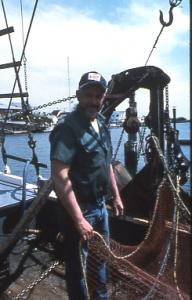Tony Sougstad

Long Island Traditions
Folklorist Nancy Solomon has documented the maritime culture of Long Island through these interviews spanning the years 1987 – 2016. The collection includes baymen, fishermen, boat builders and other maritime tradition bearers.
National Capital Contracting
On May 8, 1987, Nancy Solomon interviewed Tony Sougstad as part of the Long Island Traditions Oral History Project. Sougstad is a seasoned ocean fisherman and captain of the boat E.T. His first discussion with Solomon covers his entry into the fishing industry, the species of fish he harvests, the gear he uses, and the seasonal nature of his profession. After working as an engineer for a time, Sougstad decided to make a living out on the water, specializing in trawl or bottom fishing. Eventually, he also began to pack and sell his own catches to regional buyers. Sougstad learned the skills and knowledge necessary for the trade from observation, experience, and advice from older fishermen. He details the design and materials of different types of nets as well as various fishing techniques. Sougstad also provides insights into some of his more harrowing personal experiences, including a run-in with a severe storm that culminated in a rescue by a Russian boat and the U.S. Coast Guard in the late ‘70s.
On May 22, 1987, Nancy Solomon conducted a second interview with Sougstad for Long Island Traditions. In this session, Sougstad elaborates on the dangers and challenges associated with being a professional fisherman. In addition to regularly facing harsh weather conditions, Sougstad has had to navigate boats through changing inlets and ice flows. He also speaks to the social dynamics and information sharing practices among baymen and fishermen, noting the difficulties of breaking into an industry where a close camaraderie exists among those already in the business. However, Sougstad explains that he did receive key lessons from mentors, and he now hopes to train the next generation of fishermen to work on his boat.
Please Note: The oral histories in this collection are protected by copyright and have been created for educational, research and personal use as described by the Fair Use Doctrine in the U.S. Copyright law. Please reach out Voices@noaa.gov to let us know how these interviews are being used in your research, project, exhibit, etc. The Voices staff can help provide other useful resources related to your inquiry.
The NOAA mission is to understand and predict changes in climate, weather, oceans, and coasts, to share that knowledge and information with others, and to conserve and manage coastal and marine ecosystems and resources. The Voices Oral History Archives offers public access to a wide range of accounts, including historical materials that are products of their particular times, and may contain offensive language or negative stereotypes.
Voices Oral History Archives does not verify the accuracy of materials submitted to us. The opinions expressed in the interviews are those of the interviewee only. The interviews here have been made available to the public only after the interviewer has confirmed that they have obtained consent.
